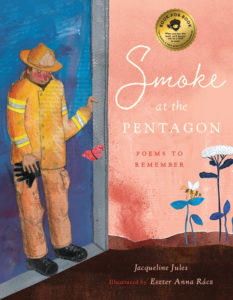“Teaching the Next Generation about September 11th”
“What happened at the Pentagon?” one of my students asked me. “Why are they ringing that bell?”
It was September 11, 2008, seven years after the 9/11 attacks. I was an elementary school librarian in Northern Virginia. A select group of students, chosen to be my library helpers, had just walked into the library. They gathered around me, watching a wall-mounted television in the center of the room. I had turned it on earlier that morning so the staff could watch the dedication of the Pentagon Memorial on C-Span.
“Why are they reading names?” another student asked. “Did people die?”
I won’t forget the upturned faces, focused on the television screen that morning. All six of my library helpers stood silently, watching a man in a white Navy suit, wearing white gloves, pull the cord on a large golden bell. Another man read names from a podium on an outdoor stage. The solemnity of the dedication ceremony was very clear to my students. Yet they were baffled by the reason for it. I was surprised.
As residents of Northern Virginia, these students were certainly familiar with the Pentagon. Like me, they’d seen the huge five-sided building with its enormous parking lot on their way to the airport or a nearby mall. But not one of the six children in front of me knew that the Pentagon had been attacked on September 11, 2001.
I shouldn’t have been shocked. These students were only four years old in 2001 and unlikely to remember much. Not all of them had even lived in Virginia at the time of the Pentagon attack. Why should they know what happened?
A good question. As a teacher, it was something I thought about a lot. Should 9/11 be a part of our curriculum? Can we understand our present society better when we have knowledge of past events?
Today’s students may not be aware of the drastic changes in airport security since 9/11. Even more importantly, they may not be aware of the way Americans came together to help each other and rebuild after 9/11. Knowing that Americans overcame tough circumstances in the past can give students the courage to face future challenges if they arise. The history of 9/11 can demonstrate the resilience of American society. The Pentagon was rebuilt within a year. It’s a story of perseverance our students should be aware of.
My collection of narrative poems, Smoke at the Pentagon: Poems to Remember, portrays the reactions of young people who experienced September 11th in Northern Virginia where the Pentagon is located. Kelvin, age 5, is on the swings at recess when he is frightened by a loud sound. Emily, age 13, describes her feelings as she watches her teacher holding on to his desk, visibly shaken by the news he shares with the class. Cyrus, age 10, waits for his father, a fireman responding to the Pentagon attack. Tyra, age 14, watches rubble cleared from the Pentagon while riding the bus to school.
The twenty poems in Smoke at the Pentagon: Poems to Remember could be performed as a Reader’s Theater. If the class has more than twenty students, the introduction can be divided up into extra speaking parts. Role-playing the different characters can help students understand and discuss many perspectives. Other teaching ideas for Smoke at the Pentagon: Poems to Remember can be found in the Teacher’s Guide posted on my website and at the Bushel & Peck website.
I hope you will consider discussing September 11, 2001 in your classrooms and at home. We are approaching the 22nd anniversary of the event. Today’s children will have no knowledge of this history if educators and other adults don’t introduce it.
Published August 1st, 2023 by Bushel & Peck
About the Book: A moving book of poems to remember 9/11 at the Pentagon.
On September 11, 2001, American Airlines Flight 77 crashed into the Pentagon in Arlington, Virginia. One hundred and eighty-four innocent people were killed. The event occurred at 9:37 a.m. and was part of a coordinated terrorist attack against the United States involving four hijacked flights.
Author Jacqueline Jules, who was a school librarian living in Arlington, Virginia on 9/11, tells the story of that day through a tapestry of poems. These poems tell the stories of young people from all aspects of the Arlington and Pentagon communities and are composites drawn from personal experiences with students and friends residing in Northern Virginia at the time of the attack.
September 11th changed childhoods. Anyone old enough to remember that day will never forget, but today’s children need to be told the story.
Download the Teacher’s Guide: http://jacquelinejules.com/images/Teacher’sGuideSMOKE%20AT%20THE%20PENTAGON.pdf
⭐”A powerful, humanistic look at the aftermath of a national tragedy, and an important purchase for modern collections.”―School Library Journal
About the Author: Jacqueline Jules is the award-winning author of over fifty books for young readers, including the Zapato Power series, the Sofia Martinez series, Unite or Die: How Thirteen Became a Nation, My Name is Hamburger, The Porridge-Pot Goblin, and Tag Your Dreams: Poems of Play and Persistence. A retired elementary school librarian and teacher, she has created numerous resources for her website, available to educators for free download. Please visit www.jacquelinejules.com.
Thank you, Jacqueline, for reminding us to teach about this life-changing day!



1 thought on “Author Guest Post: “Teaching the Next Generation about September 11th” by Jacqueline Jules, Author of Smoke at the Pentagon: Poems to Remember”